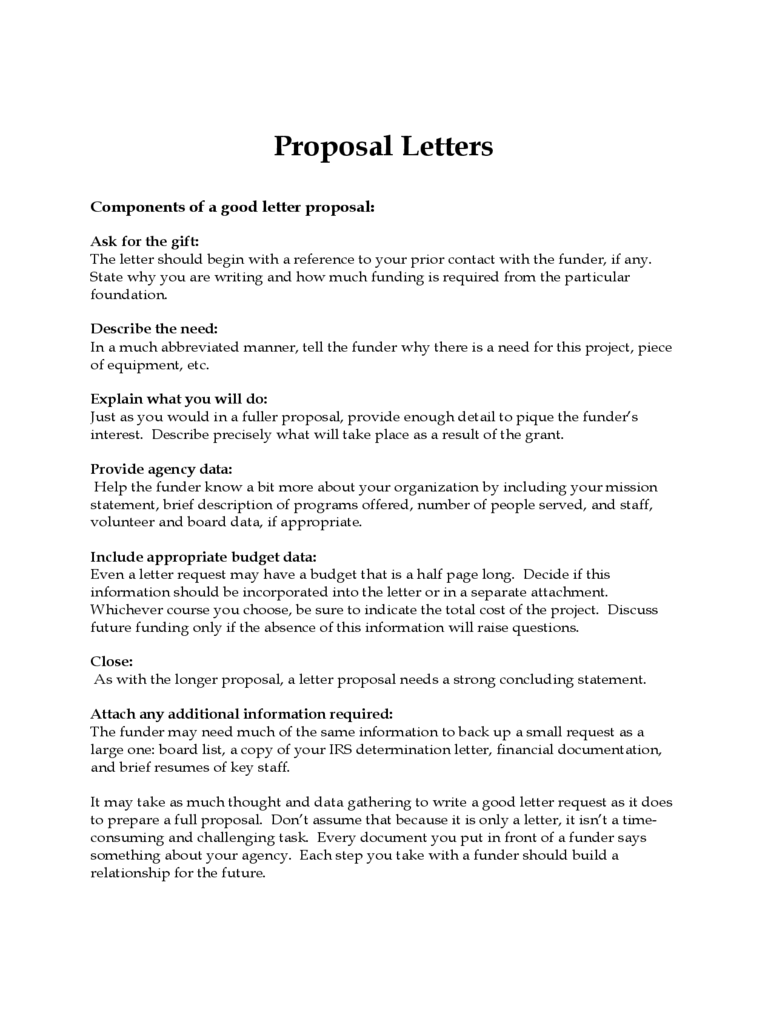Fillable Printable Proposal Letters
Fillable Printable Proposal Letters

Proposal Letters

Proposal Letters
Components of a good letter proposal:
Ask for the gift:
The letter should begin with a reference to your prior contact with the funder, if any.
State why you are writing and how much funding is required from the particular
foundation.
Describe the need:
In a much abbreviated manner, tell the funder why there is a need for this project, piece
of equipment, etc.
Explain what you will do:
Just as you would in a fuller proposal, provide enough detail to pique the funder’s
interest. Describe precisely what will take place as a result of the grant.
Provide agency data:
Help the funder know a bit more about your organization by including your mission
statement, brief description of programs offered, number of people served, and staff,
volunteer and board data, if appropriate.
Include appropriate budget data:
Even a letter request may have a budget that is a half page long. Decide if this
information should be incorporated into the letter or in a separate attachment.
Whichever course you choose, be sure to indicate the total cost of the project. Discuss
future funding only if the absence of this information will raise questions.
Close:
As with the longer proposal, a letter proposal needs a strong concluding statement.
Attach any additional information required:
The funder may need much of the same information to back up a small request as a
large one: board list, a copy of your IRS determination letter, financial documentation,
and brief resumes of key staff.
It may take as much thought and data gathering to write a good letter request as it does
to prepare a full proposal. Don’t assume that because it is only a letter, it isn’t a time-
consuming and challenging task. Every document you put in front of a funder says
something about your agency. Each step you take with a funder should build a
relationship for the future.

Sample Letter of Inquiry to a Foundation
Example (Medical Research Related)
December 9. 2009
Mr. James M. Alfred
Bristol-Myers Squibb Foundation
345 Park Avenue
New York, NY 10154
Dear Mr. Alfred:
I am writing to inquire if the Bristol-Myers Squibb Foundation would consider a
proposal from the Department of Cardiothoracic Surgery at New York University
requesting a research grant of $150,000 per year for two years, to support our research
project entitled “Calcific Aortic Stenosis: Mechanisms of Calcification and Development
of Biological Markers.” The ultimate purpose of our research is to improve the clinical
outcomes and quality of lives of patients suffering from cardiovascular diseases; this
parallels the mission of Bristol-Myers Squibb Foundation to extend and enhance human
life.
After hypertension and coronary artery disease, calcific aortic stenosis (AS) is third
most common cardiovascular disease in the Western world. With a prevalence of 3-9%,
calcific AS is also the most frequent valvular disease and the main cause for valve
replacements in patients over the age of 60. Despite the high prevalence and mortality
associated with calcific AS, there is no effective medical therapy for the disease and
little is known about the molecular mechanisms driving its pathogenesis. The aim of
our research is therefore two fold: (1) to identify proteins in patients with calcific AS
that can be used to diagnose and monitor the progression of AS, and
(2) to investigate the biological mechanism by which such proteins promote calcific AS
so that we can identify possible therapeutic targets.
This research is a collaborative effort between clinicians within the Department of
Cardiology and basic science researchers and surgeons with the Department of
Cardiothoracic Surgery at New York University. This collaboration gives us the ability
to comprehensively study the disease process of AS, from its initial diagnosis by
Cardiologists to its ultimate treatment by Surgeons. The union of the clinical expertise

from both Cardiologists and Surgeons with the analytical proficiency of Basic Scientists
makes this an exciting and innovative project that will certainly increase our
understanding of the pathogenesis of AS and hopefully serve to impact its future
treatment.
The Department of Cardiothoracic Surgery at New York University Medical Center is
an internationally recognized program performing over 1,200 open-heart operations per
year. Through the partnership between our research and clinical divisions, our
Department is uniquely poised at the forefront of cardiothoracic surgery as we have the
capability to both, study the molecular basis of diseases and to apply the knowledge
gained through research in the development of novel clinical therapies.
Thank you for your kind consideration of our project. I will be contacting you within
the next three weeks for any feedback you may have. In the meantime, please do not
hesitate to contact me if you desire additional information or if you have any questions.
I look forward to talking with you soon.
Sincerely,
Lawrence B. Green, M.D., FACS, FACC
Professor of Cardiothoracic Surgery



